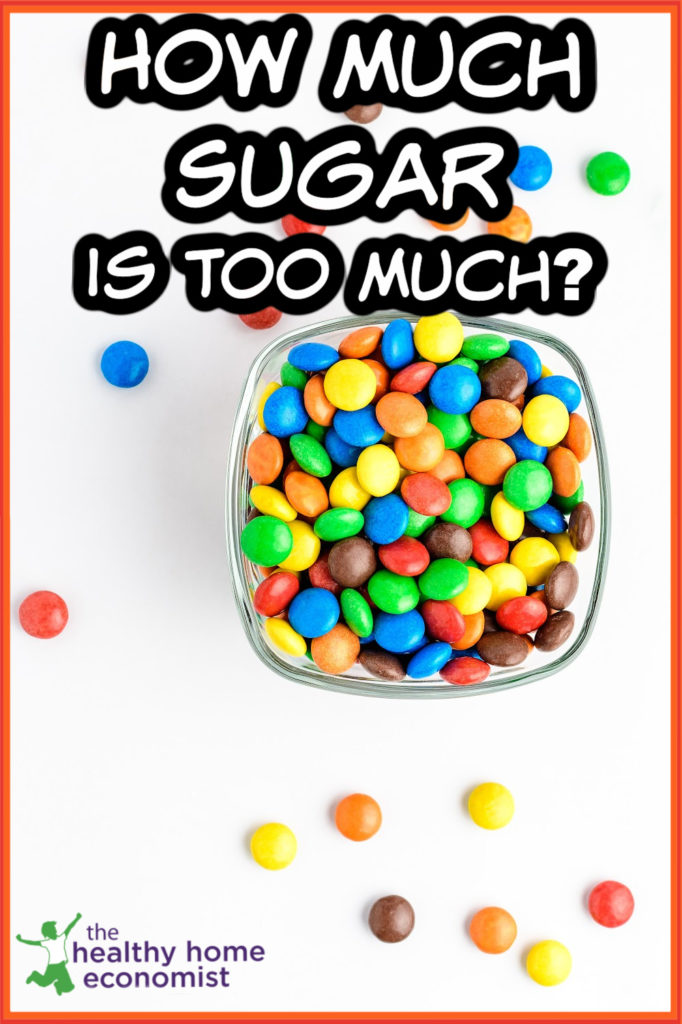The number of grams of sugar each day that adults and children should not exceed in order to avoid immune suppression, which can raise the risk of both short and long-term illness.

How much sugar a day should a person consume? How many sweets is too much? These simple questions have no doubt crossed the mind of anyone who has ever considered or certainly attempted to eat a nutritious diet!
For those raising children, this question takes on even more urgency. Excessive sweets in a toddler or adolescent’s diet can contribute to many health challenges including learning difficulties, obesity, depression, hormonal imbalance, and the list goes on. (1,2)
What Counts as Sugar?
Let’s define exactly what sugar is before attempting to identify how much per day is excessive.
Sugar is not just the granular white refined stuff that you buy at the supermarket to make homemade cookies.
Sugar is any calorie-containing substance that stimulates the sweet tastebuds on the tip of the tongue.
This means that there are several different types of sugar. Common examples include sucrose, fructose, and glucose.
Other less familiar types are dextrose, maltose, and galactose.
The bottom line is that sugar comes in many different forms, and they all count when answering the “how much sugar per day” question.
Refined vs Unrefined Sugar
The big difference between refined and unrefined sugar is its nutritional value.
When a particular source of sugar is refined, the nutrients are partially or completely removed. Don’t get refining confused with processing, however,
White sugar and high fructose corn syrup are processed and refined, meaning they offer only calories and zero nutrition.
On the other hand, blackstrap molasses and maple syrup are definitely processed sugars, but all the nutrients are intact. Hence they are considered unrefined despite the high heat necessary to process them.
Unprocessed and unrefined sweeteners like raw local honey not only contain nutrients like unrefined sugars, but they also contain probiotics and enzymes.
Ideally, your choice of sugars should fall under the unprocessed and/or unrefined categories.
Fruit Counts!
Sorry to break the bad news, but fruit and fruit juice (even if freshly squeezed) counts toward a person’s daily sugar intake too.
While fructose does not affect blood sugar as drastically as sweeteners that break down into glucose, it still affects immunity.
So, even if you only eat whole or dried fruit, you still need to watch out that you don’t overconsume!
This is especially important for young children.
It is very easy for a young child to eat a lot of sugar even with no processed foods in the diet!
Thus, significantly reducing or eliminating fruit juice is a very big step forward to protect their health. (3)
As a bonus, eliminating juice may have the added benefit of naturally resolving issues with canker sores.
This doesn’t mean the fruit juice has no place in the diet whatsoever. A small glass of fresh-pressed juice on occasion is fine. In addition, I use diluted, freshly squeezed juice during illness or to naturally bring a fever down when the appetite might be suppressed.
How Much Sugar in a Banana, Apple or Orange?
A medium-sized, ripe apple contains about 19 grams of fructose-based sugar.
Navel oranges? About 23 grams each.
A medium-sized, ripe banana contains about 14 grams of fructose.
By comparison, 3 oreo cookies contain 14 grams of sugar — exactly the same as a banana!
Does this mean the sugar in a banana and 3 oreo cookies is exactly the same?
Essentially yes it does. However, the banana offers nutrition in the form of vitamins and minerals whereas the oreo cookies offer only empty calories.
The bottom line is that just because you are getting nutrition with your sugar source doesn’t negate the fact that you are still eating sugar.
Daily Sugar Intake
Now that we’ve established some ground rules on exactly what counts toward the “how much sugar per day” total, let’s answer the question!
For a healthy adult that is free of chronic disease, it is best to stay at or below 36 grams of sugar per day from ALL sources.
According to Tom Valentine in his classic anthology Search for Health, significant immune system suppression begins to occur above 36 grams daily for adults.
He goes on further to say that once the immune system is depressed from a single 24-hour period of eating too many sweets, the effects of reduced immunity can last an additional 24-72 hours. (4)
And, the more you exceed the 36 grams threshold, the more immunity goes into the tank.
Ever wondered why colds or flu tend to hit right after a sugary-filled holiday?
Yes, exactly! All that sugar suppressed the immune system and so whatever bugs are floating around at the time have an easier time taking hold.
Thus, those who regularly consume more than 36 grams of sugar day in and day out are walking around with perpetually depressed immunity.
For children under the age of twelve, half of the adult amount (no more than 18 grams of sugar) per day from all sources is a rule of thumb I’ve always followed based on Mr. Valentine’s research.
This isn’t much is it? A single apple already hits the upper limit of sugar per day for a young child!
Does keeping sugar intake to 36 grams or less per day from all sources seems unattainable? It isn’t as difficult as you might think at first. Check out my guide to getting sugar under control for a straightforward 4 step process.

(1) Sugar in Infants, Children and Adolescents: A Position Paper of the European Society for Paediatric Gastroenterology, Hepatology and Nutrition Committee on Nutrition
(2) The Relationship between Diet and Mental Health in Children
(3) Fruit Juice in Infants, Children, and Adolescents: Current Recommendations
(4) Search for Health







This suggests I can’t consume even two pieces of fruit a day, as that would use up all of my allowance. E.g. orange + apple (23+19=42). What about the fiber that slows down the absorption of sugar? I notice that I only get sick when consuming too much refined sugars, but don’t get sick when avoid them and still consume unrefined treats and fruit.
Has the research on 36g per day been done on healthy adults who consume only natural sweeteners to see if their immune system would be suppressed if they went above that number?
Fruit is a stealth form of sugar. People assume it is healthy, which it is … in VERY small amounts.
When it comes to children, families that eat healthy are sometimes baffled why the children are so often sick …. a common reason is because the children are eating a lot of fruit which keeps their immune system constantly suppressed.
Hm… what about those who work out 6-7 days a week lifting weights and/or Crossfit and/or cardio? I assume it would be safe to increase sugar intake. Right?
Increasing unrefined carbs would be fine, but not sugar.
36 grams per day (is that after subtracting the fiber grams for net carb total?)
Yes, fiber doesn’t count 🙂
Fruit sugar aka fructose is processed by the liver. Most of the other is glucose, which is stored in the muscles and the excess as fat. Too much fruit can be hard on your liver..
So what about if you exercise a lot and burn a lot of those sugars up? Wouldn’t there be a sliding scale based on physical exertion?
You can never out exercise a bad diet!
No! Fruit does not suppress the immune system!!!! It helps it!!! Fruit is basically nature’s perfect food. It’s what God gave us to eat to keep us healthy. Plants = real food! The sugar is completely different in our bodies than the processed sugar people eat now! My kids and I eat a lot of fruit and we are extremely healthy. When they do get sick we up our fruit intake and our symptoms are decreased! Our country would be A LOT healthier if people ate more fruit. A lot. Please stop spreading the lie that too much fruit is bad for you!
Some fruit in the diet is wonderful. It is high in antioxidants and definitely helpful to the immune system. But, eat too much and it can do just the opposite! Consider omega-3 fats … same thing. Small amounts reduce inflammation and are good for immunity, but get too much and they contribute to inflammation!
So many overlook the fact that fruit is a source of sugar! And, if you think that too much fruit is not bad for you, that is concerning. Consider Steve Jobs (may he rest in peace!) who was a self-described fruitarian … was diagnosed with pancreatic cancer (aka … too much sugar disease) at a very young age.
The lack of an ability to moderate oneself and the false belief that “if some is good, MORE must always be BETTER” is at the root of many of our modern dietary problems today.
If you use a blood glucose monitor all of you would see that grains count as sugar all of them. They are worse than most other sugars.
Refined grains .. I would agree as these foods are one small step away from sugar. Whole grains prepared traditionally … no. Please note that in the post I specified “healthy adults free of chronic disease” Those with diabetes who need to monitor blood sugar closely are going to have to cut out a lot more than sugar potentially and their insulin levels are not normal.
Seems like there’s a lot of foods that still need to be dissected as far as their sugar or glycemic affect. Like our gluten free pancakes, or our raw milk, or sourdough. I know various breads especially have a high glycemic index which is different but still a sugar affect., also we drink 18-20 oz a day of raw milk which I think has 36 grams of lactose for 24 ounces. So do we limit raw milk?
Lactose is sugar … yes. So raw milk carbs would count toward that 36 grams. Please note that in the article I specified that sugar comes in many different forms. Bread, if refined, is nearly sugar that is true. But properly prepared whole grain bread is fine for healthy adults with no chronic disease. If you already are having blood sugar issues, your body may react to other foods much in the same way as sugar. Please note that in the article this is clearly specified! The 36 gram upper limit is based on a healthy adult free of chronic disease (e.g., insulin levels operating within normal range!). If your health is such that you need to be much stricter than the 36 grams, then by all means do so upon the advice of your physician!
Hi Sara,
Can you provide more research articles on the negative impact of whole fruits? I find many positive impacts.
Your first reference states the FREE sugar should be avoided and that “Sugar naturally present in intact fruits…is not free sugar.”
Do a search in Google for “NIH Fruit.” The problem seems to be fruit juice, not whole fruit. Here are just a few articles.
Yes, fruit juice is the worst. However, you can still eat too much whole fruit! In particular, I see a lot of children eating far too much fruit, which kills the appetite for other foods because they are eating so much sugar. It also depresses their immunity considerably. The reference in Search for Health is what I’m referencing with regard to whole fruit counting toward the total number of grams per day(36 grams the upper limit for adults).
WOW! So Powerful, but yet no one is talking about it! Thank you Sarah!